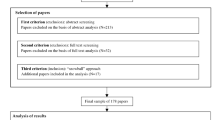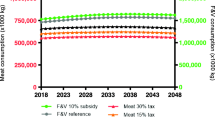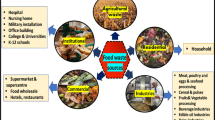Abstract
Global call for healthy and sustainable food production and consumption has been loud, and the majority of these calls center on ensuring food security through sustainable agriculture. The other parts of the food supply chain such as consumption, packaging, recycling, and food waste management seem to be overlooked especially by developing nations of the world where attention is mainly placed on production. But in the broad sense, public health and environmental quality could be adversely impacted by neglect, mismanagement, or loophole on any of these food management systems. Hence, the current work studies the health and environmental impacts of local food packaging materials, adopting Nigeria as a proxy for the developing world. A review was first conducted to appraise the sustainability aspects of achieving and using natural leaves as a packaging material for traditional foods in Nigeria. The result of the review rightly shows that leaf-type packaging material has several apparent health and environmental advantages for food packaging. In view of this, the current work proposes a theoretical circular economy model that would ensure the constant and sustainable availability of these local packaging materials, especially in the urban centers.



Similar content being viewed by others
Data availability
Not applicable.
References
Abdullahi N (2014) Hazard chemicals in some food packaging materials (a review). Ann Food Sci Technol 15(1):115–120
Adejumo BA, Ola FA (2008) The appraisal of local food packaging materials in Nigeria. Cont J Eng Sci 3:13–20
Adeyeye SA (2017) Safety issues in traditional West African foods: a critical review. J Culinary Sci Technol 15(2):101–125
Aluko OO, Ojeremi TT, Olaleke DA, Ajidagba EB (2014) Evaluation of food safety and sanitary practices among food vendors in Ile Ife, southwestern Nigeria. Food Control 40:165–171
Arah IK, Kumah EK, Anku EK, Amaglo H (2015) An overview of post-harvest loses in tomato production in Africa. Causes and possible prevention strategies. J Biol Agric Healthc 5(16):78–90
Asthana DK (2006) Text book of environmental studies. New Delhi, S Chand & Company Ltd, p 397
Center for Science in the public interest (CSPI) (2005) Food safety around the world. CSPI, Washington DC
Chukuezi CO (2010) Entrepreneurs of the street: socio-economic features of street food vending in Owerri, Nigeria. Eur J Soc Sci 146(2):183–188
Clayton DA, Griffith DJ, Price P, Peters AC (2002) Food handlers beliefs, and self-reported practices. Int J Environ Health Res 12:25–39
Cohen M (1990) Women and urban street trade: some implications for policy. Working paper 55 of the office of women in development, USAID
Dainelli D, Gontard N, Spyropolous D, Zondervan-van, de Beuken E, Tobback P (2008) Active and intelligent food packaging; legal aspects and safety concerns. Trends Food Sci Technol 19(1):S103–S113
de Zeeuw H, Prain G (2011) Effects of the global financial crisis and food price hikes of 2007/2008 on the food security of the poor urban households. Urban Agric Mag 25:36–38
Ekpa O, Palacious-Rojas N, Kruseman G, Fogliano V, Linnemann AR (2019) Sub-Saharan African maize-based foods-processing practices, Challenges and Opportunities. Food Rev Int 35:609–639. https://doi.org/10.1080/87559129.2019.1588290
Ellen MacArthur Foundation (2019) Concept: what is a circular economy? A framework for an economy that is restorative by design. Available online at https://www.ellenmacarthurfoundation.org/circular-economy/concept. Accessed 20 July 2020
Essuman KM (1990) Local packaging of foods in Ghana. Food Nutr Bull 12:1-5 Available online at: https://doi.org/10.1177/156482659001200101 Accessed 1 June 2019
Ezeudu OB, Ezeudu TS (2019) Implementation of circular economy principles in industrial solid waste management: case studies from a developing economy (Nigeria). Recycling. 4(4):42
Ezeudu OB, Ozoegwu CG, Madu CN (2019a) A statistical regression method for characterization of household solid waste: a case study of Awka municipality in Nigeria. Recycling. 4:1
Ezeudu OB, Agunwamba JC, Ezeasor IC, Madu CN (2019b) Sustainable production and consumption of paper and paper product in Nigeria. A review. Resources 8(1):53
FAO (2008) The state of food insecurity in the world high food prices and food security—threats and opportunities, food and agriculture organization of the United Nations, Rome, Italy
Ferronato N, Rada EC, Portillo MA, Cioca LI, Ragazzi M, Torretta V (2019) Introduction of circular economy within developing regions: a comparative analysis of advantages and opportunities for waste valorization. J Environ Manag 230:366–378
Fields GS (1990) Labour market modelling and urban informal sector: theory and evidence. In: Tumham D, Salome B, Schwartz A (eds) The informal sector revisited. OECD, Paris, pp 298–315
Food Aid Foundation (2019) Hunger Statistics. Available online: http://www.foodaidfoundation.org/world-hunger-statistics.html. Accessed 17 Aug 2020
Forster A (2013) Sustainability: best practices in the food industry. J Undergrad Res XVI. http://rootshyft.com/wp-content/uploads/2018/03/Sustainability-Alexandra-Forster.pdf. Accessed 17 Oct 2020
Gerland P, Raftery AE et al (2014) World population stabilization unlikely this century. Science 346(6206):234–237 Available online: https://science.sciencemag.org/content/346/6206/234. Accessed 10 June 2019
Geueke B, Groh K, Muncke J (2018) Food packaging in the circular economy: overview of chemical safety aspects for commonly used materials. J Clean Prod 193:491–505
Ghosh PR, Fawcett D, Sharma SB, Poinern GEJ (2016) Progress towards sustainable utilization and management of food waste in the global economy. Int J Food Sci:3563478. https://doi.org/10.1155/2016/3563478
Gomez-Baggethun E, Barton DN (2013) Classifying and valuing ecosystem services for urban planning. Ecol Econ 86:235–245
Haas W, Krausmann F, Wledenhofer D, Helnz M (2015) How circular is the global economy? An assessment of material flows, waste production, and recycling in the European Union and the world in 2005. J Ind Ecol 19:765–777
Hall C, Dawson TP, MacDiarmid JI, Mathews RB, Smith P (2017) The impact of population growth and climate change on food security in Africa: looking ahead to 2050. Int J Agric Sustain 15(2):124–135. https://doi.org/10.1080/14735903.2017.1293929
Idowu IA, Altherton W, Hashim K, Kot P, Alkharddar R, Alo BI, Shaw A (2019) An analyses of status of landfill classification systems in developing countries: sub-Sahara African landfill experiences. Waste Manag 87:761–771
Kong L, Lau KK, Yuan C, Chen Y, Xu Y, Ren C, Ng E (2017) Regulation of outdoor thermal comfort by trees in Hong Kong. Sustain Cities Soc 31:12–25. https://doi.org/10.1016/j.scs.2017.01.018
Laistrooglai A, Mosikarat P, Wigran M (2000) Packaging design with natural materials: a study of conservation. Silpacom University research and development institute. Available online at: http://www.thaiscience.info/journals/Article/SUIJ/10559514.pdf. Accessed 17 Aug 2020
Li R, Hu H-B, Li X-F, Zhang P, Xu YK, Yang J-J (2015) Essentials oils composition and bioactivities of two species leaves used as packaging materials in Xishuangbanna, China. Food Control 51:9–14
Marsh K, Bugusu B (2007) Food packaging-roles, materials and environmental issues. Inst Food Technol. https://doi.org/10.1111/j.1750-3841.2007.00301.x
Mensah P, Yeboah-Manu D, Owusu-Darko K, Ablordey A (2002) Street foods in Africa: how safe are they? Bull World Health Organ 80(7):546–554
Mensah JK, Adei E, Adei D, Ashie MD (2012) Perceptions of the use of indigenous leaves as packaging materials in the ready-to-eat cornmeals. Int J Biol Chem Sci 6(3):1051–1068
Mensah JO, Aidoo R, Teye AN (2013) Analysis of street food consumption across various income groups in the Kumasi Metropolis of Ghana. Int Rev Manage Bus Res 2(4):951
Mustafa M, Nagalingan S, Tye J, Hardy Shafii AS, Dolah J (2012) Looking back to the past: revival of traditional food packaging. Regional conference On local Knowledge. 15–16 October, jerejak Rainforest Resort, Penang
Nguimkeu PA (2014) Structural econometric analysis of the informal sector heterogeneity. J Dev Econ 107:175–191
Oguntoyinbo FA (2014) Safety challenges associated with traditional foods of West Africa. Food Rev Int 30(4):338–358
Ojo EO, Adebayo PF (2012) Food security in Nigeria: an overview. Eur J Sustain Dev 1(2):199–222
Olaoye OA, Ntuen IG (2011) Spoilage and preservation of meat: a general appraisal and potential of lactic acid bacteria as biological preservatives. Int Res J Biotechnol 2:33–46
Ozoegwu CG, Eze C, Onwosi CO, Mgbemene CA, Ozor PA (2017) Biomass and bioenergy potential of cassava waste in Nigeria: estimations based partly on rural-garri processing case studies. Renew Sust Energ Rev 72:625–638
Pal M, Devrani M, Hadush A (2019) Recent developments in food packaging technologies. Beverage Food World 46(1):21–25
Rajagopalan K (2018) Benefits of eating in Banana leaf. Anudinam, sri vashinava news forum. Published February 1, 2018. Available online at: https://anudinam.org/2018/02/01/benefits-of-eating-in-banana-leaf/. Accessed 20 Aug 2020
Reisch L, Eberie U, Lorek S (2013) Sustainable food consumption: an overview of contemporary issues and policies. Sustain Sci Pract Policy J 9(2):7–25
Salguero-Puerta L, Leyva-Diaz JC, Cortez-Garcia J, Molina-Molino V (2019) Sustainability indicators concerning waste management for implementation of the circular economy model on the University of Lome (Togo), Campus. Int J Environ Res Public Health 16(12):2234
Salmond JA, Tadaki M, Vardoulakis S, Arbuttnott K, Coutts A, Demuzere M, Dirks KM, Heavisde C, Lim S, Macintyre H, Mclnnes RN, Wheeler BW (2016) Health and climate-related ecosystem services provided by street trees in the urban environment. Environ Health 15(1):S36
Scarlet N, Motola V, Dallenmand JF, Monforti-Ferrario E, Mofor L (2015) Evaluation of energy potential of municipal solid waste from African urban areas. Renew Sust Energ Rev 50:1269–1286
Schneider F (2002) Size and measurement of the informal sector in 110 countries around the world. Paper presented at the workshop of Australian national tax center. ANU, Canberra, Australia. July 17, Available online: http://www.amnet.co.il/attachments/informal_economy110.pdf. Accessed 17 June 2019
Seth MK (2003) Trees and their economic importance. Bot Rev 69(4):321–376
Sheth J (2011) Mindful consumption: a customer-centric approach to sustainability. Published on January 14, 2011. Available online: https://www.jagsheth.com/consumer-behavior/mindful-consumption-a-customer-centric-approach-to-sustainability/. Accessed 5 June 2019
Smit W (2016) Urban governance and urban food system in Africa: examining the linkages. Cities. 58:80–86
Stahel WR (2016) The circular economy. Nature 531:435–438
Steel C (2008) Hungry cities: how food shapes our lives. Chatto and Windus, London
The World Bank (2012) What a waste: a global review of solid waste management. In: The urban development series knowledge paper. The World Bank, Washington DC
Ukenna SI, Ayodele AA (2019) Applying the extended theory of planned behavior to predict sustainable street food patronage in a developing economy. J Food Prod Mark 25:404–434. https://doi.org/10.1080/10454446.2019.1572561
United Nations Children’s Emergency Fund (UNICEF) (2011) Levels and trends in child mortality, Estimates Developed by the UN Inter-agency Group for Child Mortality Estimation
Varum, Sharma A, Nautiyal H (2016) Environmental impacts of packaging materials. In environmental footprints of packaging. Springer Science, Singapore
Walsh J (2010) Street vending and the dynamics of informal economy: evidence from Vung. Tau, Vietnam. Asian Soc Sci 8(11):159–165
Wilson DC, Rodic L, Modak P, Soos R, Carpintero A, Velis K, Iyer M, Simonett O (2015) The global waste management outlook report. United Nations Environmental Programme, UNEP
Author information
Authors and Affiliations
Contributions
OBE conceptualized, investigated, formally analyzed the research data, and wrote the original draft of the manuscript. TSE and ICE substantially reviewed and revised the manuscript. UCU and JCA supervised the project. All authors read and approved the final manuscript.
Corresponding author
Ethics declarations
Competing interests
The authors declare that they have no competing interests.
Ethical approval
Not applicable.
Consent to participate
Not applicable.
Consent to publish
Not applicable.
Additional information
Responsible Editor: Philippe Loubet
Publisher’s note
Springer Nature remains neutral with regard to jurisdictional claims in published maps and institutional affiliations.
Rights and permissions
About this article
Cite this article
Ezeudu, O.B., Agunwamba, J.C., Ezeudu, T.S. et al. Natural leaf-type as food packaging material for traditional food in Nigeria: sustainability aspects and theoretical circular economy solutions. Environ Sci Pollut Res 28, 8833–8843 (2021). https://doi.org/10.1007/s11356-020-11268-z
Received:
Accepted:
Published:
Issue Date:
DOI: https://doi.org/10.1007/s11356-020-11268-z




